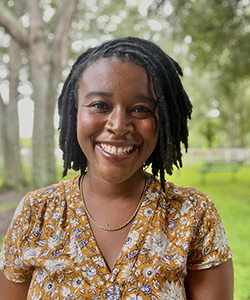 Jennifer Winston is a senior research analyst at Child Trends. Her work supports Child Trends’ research on Black and Indigenous children and families. She helps with literature reviews, conducts data analyses, and completes other research-related tasks that are helpful to these projects.
Jennifer Winston is a senior research analyst at Child Trends. Her work supports Child Trends’ research on Black and Indigenous children and families. She helps with literature reviews, conducts data analyses, and completes other research-related tasks that are helpful to these projects.
Can you tell us about your primary research interest(s)?
My research interests include racial and ethnic equity, social and emotional development, and family studies. I’m particularly interested in how culture and family dynamics can be used to support the social and emotional development of school-age children following a traumatic event in their lives. We often refer to these elements as “protective factors.”
What sparked your interest in equity, child development, and protective factors?
I enrolled in a secondary data analysis course during graduate school, where we were asked to use the National Survey of Children’s Health to answer a research question of our choosing. I examined the relationship between a child’s exposure to adverse childhood experiences (ACEs) and their diagnosis of a developmental delay. Results from my graduate research study reported that young children exposed to such events were more likely to be diagnosed with a developmental delay. This simple class project inspired me to delve into understanding the concept of ACEs as they relate to Black and immigrant children and their behavioral well-being, as well as the effects of protective factors like family and cultural connectedness.
What books or journal articles have most influenced you?
Felitti et al.’s (1998) original ACEs study has influenced me the most in my professional career. This study was the beginning of our understanding that young children are vulnerable beings and what happens during childhood impacts their entire lives. I wanted to use my research skills to unpack this concept some more: What other adverse childhood experiences were not accounted for in the original study? Does the presence of these experiences differ by various demographic identities? In what ways do these experiences impact a child’s ability to navigate their emotions? How might cultural traditions and/or parental closeness serve as protective factors? You could say that this one study opened a whole new world for me!
What are your hobbies or interests outside of research?
Outside of research, you might find me watching sitcoms or going on walks with my dog. My favorite show at the moment is Abbott Elementary. If dry humor is your thing, I definitely recommend you watch an episode or two. I also enjoy finding new restaurants around town to try out with my husband. Luckily, living in Florida means there is an abundance of cuisines to test out. I would like to try authentic Nigerian, Peruvian, or Italian food next. I plan on visiting a local family-owned Italian restaurant, where they make their homemade dishes tableside.
To wrap up, can you tell us a fun or interesting fact about yourself or your family?
Fun fact: I am certified as a labor doula! A doula provides emotional, physical, and informational support to the family as they welcome their little one. In fact, I recently supported my sister in the birth of my precious little niece. I put battery-operated tea lights around the room to create a calming atmosphere and recited birth affirmations to provide encouragement because giving birth is not an easy task. I was so grateful to be by my sister’s side during that transformative moment, and to witness her undeniable strength and see my niece enter this world was such a beautiful experience. I hope to provide labor support to my family and close friends in the future!
© Copyright 2025 ChildTrendsPrivacy Statement
Newsletter SignupLinkedInYouTubeBlueskyInstagram